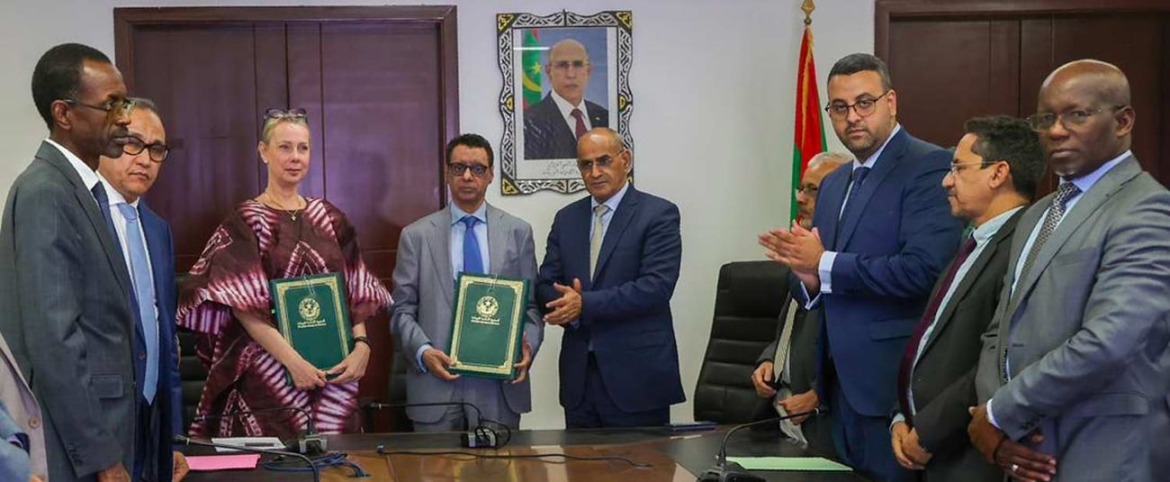Mauritania is set to become a regional leader in renewable energy, thanks to a $289.5 million financing package from the African Development Bank (AfDB) and the Green Climate Fund (GCF). The funds will support two major projects that aim to develop solar power generation, transnational electricity interconnection, and rural electrification in the country.
The financing agreements were signed on Thursday in Nouakchott by Mauritania’s Minister of Economy and Sustainable Development, Abdessalam Mohamed Saleh, and the AfDB’s Deputy Managing Director for North Africa, Malinne Blomberg. The ceremony was also attended by the Minister of Energy, Oil and Mines, Nany Ould Chrougha, and the heads of the national electricity company (SOMELEC) and the regional energy management company (SOGEM).
The first project, the 225 Kv Mauritania-Mali electricity interconnection and associated solar power plants development project (PIEMM), is part of the AfDB’s Desert to Power Initiative, which aims to provide universal access to electricity in the Sahel region by harnessing the abundant solar potential. The project will establish a 1,373-kilometer high-voltage power line, with a transit capacity of 600 megawatts (MW) between the two countries, and develop solar power plants with a total capacity of 80 MW in Mauritania.
The PIEMM will boost solar energy production and provide access to electricity for more than two million people in Mauritania and Mali, while also enhancing regional integration and trade. The project is financed by a $272 million loan from the African Development Fund, the concessional window of the AfDB, and a $1.5 million grant from the GCF. This is the largest financing ever granted by the AfDB to Mauritania.
The second project, the project to strengthen productive and energy investments for the sustainable development of rural areas (RIMDIR), is a $16 million grant from the Sustainable Energy Fund for Africa (SEFA), a multi-donor trust fund managed by the AfDB. The project will provide rural electrification for 40 localities in south-eastern Mauritania, through the installation of hybrid mini photovoltaic power plants and the construction of connecting lines. The project will also support value-creating activities, especially in the food cold chain and agri-food processing.
The RIMDIR will improve the living conditions and economic opportunities of more than 42,000 people in rural areas, while also reducing greenhouse gas emissions and dependence on fossil fuels. The project will be implemented through a public-private partnership (PPP) model, involving the participation of local communities and the private sector.
The two projects are aligned with Mauritania’s national development strategy, which seeks to guarantee access to electricity for all citizens by 2030 and to exploit the country’s renewable energy potential. They are also in line with the AfDB’s High 5 priorities, especially Light up and Power Africa, and the GCF’s strategic objectives, such as low-emission and climate-resilient development.
“There can be no sustainable, diversified economic growth without high-quality, reliable electricity that is accessible to all. Within this framework, the government has drawn up ambitious programs seeking to guarantee access to electricity for all citizens by 2030, and this requires the optimal exploitation of the energy sources available in the country, to which this financing from the African Development Bank will contribute,” said Mr. Abdelssalam Mohamed Saleh.
“Today we are signing financing agreements that pave the way for Mauritania’s energy transition. The two projects will improve people’s daily lives with new opportunities for green growth, sustainable investment, and jobs. They attest to the excellence of our relations with Mauritania, which they help to strengthen,” said Mrs Blomberg.
The AfDB has been active in Mauritania for over 50 years, supporting various strategic development sectors, such as agriculture, governance, water and sanitation, energy, mining, private sector, transport, and social.
Source: Zawya



